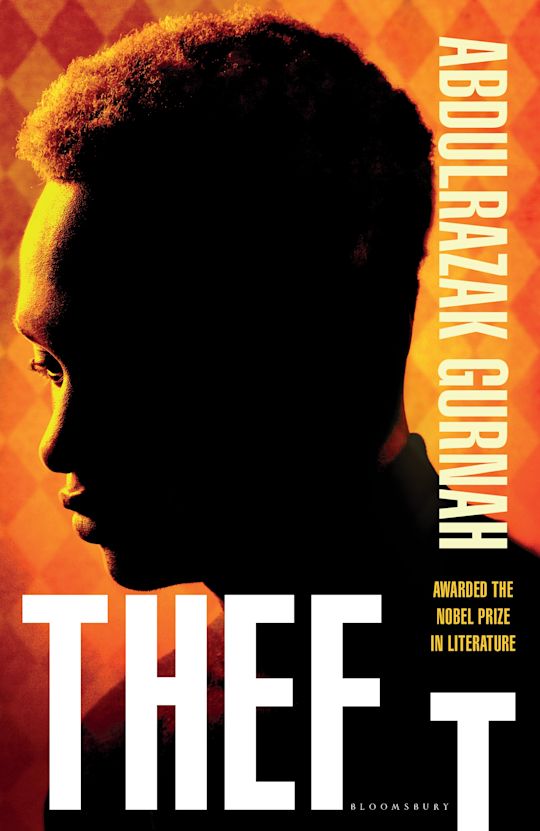
- Free Article: No
- Contents Category: Fiction
- Review Article: Yes
- Article Title: Chance
- Article Subtitle: A novel with a Conradian debt
- Online Only: No
- Custom Highlight Text:
What’s in a novel’s epigraph – this one for example: ‘In a general way it’s very difficult for one to become remarkable’? We might read these words as an elliptical suggestion that the narrative we are about to encounter will raise the question of character. Perhaps we will witness one or more characters struggling to achieve something out of the ordinary – or struggling in entirely unremarkable ways, remaining unremarkable. Such is the stuff of much of the best fiction, after all, as well as the course of most lives.
- Featured Image (400px * 250px):

- Alt Tag (Featured Image): Andrew van der Vlies reviews ‘Theft’ by Abdulrazak Gurnah
- Book 1 Title: Theft
- Book 1 Biblio: Bloomsbury, $32.99 pb, 351 pp
- Book 1 Cover Small (400 x 600):

- Book 1 Cover (800 x 1200):

- Book 1 Readings Link: https://www.readings.com.au/product/9781526678645/theft--abdulrazak-gurnah--2025--9781526678645#rac:jokjjzr6ly9m
The provenance of this epigraph, which stands at the head of Abdulrazak Gurnah’s new novel, confirms that both readings are appropriate (and to both novels). It comes from Joseph Conrad’s 1913 novel Chance, which might have been his most commercially successful book (aimed, cynics might say, at the middlebrow reader), but which was no less concerned with his perennial themes: fidelity to principle – whether craft or a general sense of the good over the expedient – in the face of the indifference of the universe, before which the smallness of human actions, plans, and desires are revealed to be merely variations in a minor key of some dimly apprehended theme.
These Conradian preoccupations seem entirely germane to Theft, which unfolds chiefly in coastal Tanzania in the later 1990s, though we see something of the youths of the novel’s three chief characters – Karim, Fauzia, and Badar – over the preceding two decades. Gurnah’s text is concerned with cycles of behaviour repeating themselves and with the question of character in the face of what is understood by these young people themselves to be the operation of fate; each rises to the challenge differently, and not always in ways that their upbringing might have led them to believe likely (as is often the case for Conrad’s characters, too).
Karim is the child of a wilful young mother, Raya, married off by her family in haste to an apparently ‘amiable man in his forties’ when they discover she is being courted by a freedom fighter. Bakari Abbas might seem ready to ‘save everyone from humiliation and disgrace’, but the personal cost is too high for Raya, who abandons the abusive relationship, taking their toddler to her parents in Zanzibar, and later leaving the boy there as she makes a new life for herself in Dar es Salaam, marrying a well-meaning and moderately well-to-do pharmacist, Haji. ‘Karim was not completely surprised by her departure,’ we learn. He spends the remainder of his school years with his elder half-brother and his sister-in-law, who helps broker a marriage, in due course, to schoolteacher Fauzia.
Fauzia has overcome her childhood epilepsy, excelled at school, and committed herself to public service as a teacher, much to her closest friend Hawa’s world-weary bemusement. ‘In an ideal world, you might be instructing intelligent, hard-working youths who are destined to become responsible citizens of the world,’ she berates her friend. ‘But you are not living in an ideal world, and the crowd you’ll be teaching will be like the herd that we were schooled with, or something like them, rude, uninterested, bored and uninformed.’ In a Conradian universe, these would be the naïve or the unlettered, either blessed with a lack of consciousness of the real state of the world or spared the cynicism that comes with a refined sense of obligations to a vocation, or a noble ideal. They are often spared the tragic fate that befalls Conrad’s more complex main characters – think the robust Singleton in Narcissus, Stevie in The Secret Agent, or the eponymous ‘hero’ of Nostromo, versus the latter’s Martin Decoud.
Gurnah’s Karim is more Decoud than Nostromo, growing from a ‘lanky, soft-spoken, self-possessed boy whose unwavering gaze sometimes disconcerted grownups’ to a handsome university scholarship student and subsequently a civil servant, destined, everyone says, to be a cabinet minister. As a child, Karim had ‘at times wondered why parents like his, who were neglectful and unloving, bothered to have children’. Entirely unsuited for fatherhood’s demands – narcissism replaces, or emerges from, what is earlier called his self-possession – he takes decisions that recapitulate those of his parents. Some readers might feel the gradual removal of readerly affection for Karim to be Theft’s great heist, though that would be to miss the complex accounting for chance, self-consciousness, and agency that acquit the novel’s Conradian debt fittingly.
In this economy, it is the third chief character, Badar, who emerges as Gurnah’s champion of moral attention, remarkable in his refusal to see himself as such and thus not make claims on others that cannot be repaid. Raised in the country by a foster family without affection, Badar is brought to Raya and Haji’s house as a servant, removed from school and all he has known, forced to navigate a simmering contempt directed at him by Haji’s father, Othman, who had, it turns out, suffered a crime at the hands of Badar’s father, a distant kinsman (whom Badar has never known). Othman forces Badar’s ejection from the house, which allows Karim to present himself as the teenager’s saviour (as his own father had saved his mother from dishonour).
Karim’s exacting of Badar’s apparent debt, and its eventual frustration, provides much of the pleasure of the novel’s final section, in which Zanzibar’s complex insertion into Western economies of charity and indebtedness comes to echo Theft’s interpersonal politics. It is here that the title reveals its metaphorical charge, for each actual ‘theft’ in the novel, bar Badar’s father’s, turns out a red herring. What other thefts are at stake in an age of mass tourism that reduces complex societies to exotic backdrops for holiday drama – or volunteering? These play their own part in the novel’s denouement, which leaves two of the three chief characters daring to steal their own happiness from the jaws of fate. It is a happier ending than Joseph Conrad might have countenanced.


Comments powered by CComment